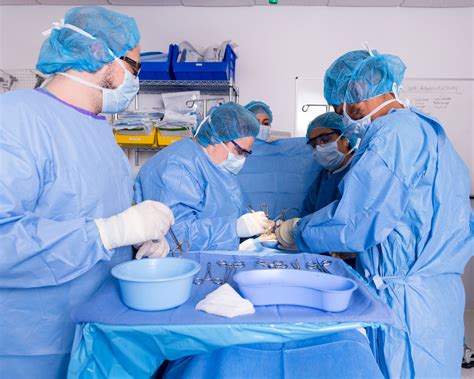On-the-job training is a crucial aspect of becoming a skilled surgical technician. While formal education provides a solid foundation, hands-on experience is essential to mastering the skills and techniques required in this field. In this article, we will explore the importance of on-the-job training for surgical technicians, the benefits, and the steps to get the most out of this type of training.
The Importance of On-the-Job Training
Surgical technicians, also known as operating room technicians or surgical technologists, play a vital role in the healthcare system. They are responsible for preparing operating rooms, sterilizing equipment, and assisting surgeons and nurses during surgical procedures. The work requires attention to detail, strong communication skills, and the ability to remain calm under pressure. On-the-job training is essential to develop these skills and become proficient in the work environment.

Benefits of On-the-Job Training
On-the-job training offers numerous benefits for surgical technicians, including:
- Practical experience: On-the-job training provides the opportunity to apply theoretical knowledge in a real-world setting.
- Improved skills: Hands-on experience helps to develop the skills and techniques required to perform tasks efficiently and effectively.
- Enhanced confidence: As surgical technicians gain experience, they become more confident in their abilities, which is essential in a fast-paced and high-pressure work environment.
- Better understanding of hospital policies: On-the-job training helps surgical technicians to understand hospital policies and procedures, which is crucial for maintaining a safe and efficient work environment.
Steps to Get the Most Out of On-the-Job Training
To get the most out of on-the-job training, surgical technicians should follow these steps:
- Be proactive: Take initiative to seek out learning opportunities and ask questions.
- Set goals: Establish goals for what you want to achieve during your on-the-job training.
- Seek feedback: Ask for feedback from experienced surgical technicians and supervisors.
- Reflect on experiences: Reflect on your experiences and identify areas for improvement.
- Stay organized: Keep track of your progress and maintain a record of your training.
Types of On-the-Job Training
There are several types of on-the-job training that surgical technicians can participate in, including:
- Preceptorship programs: These programs pair experienced surgical technicians with new employees to provide guidance and support.
- Mentorship programs: These programs pair experienced surgical technicians with new employees to provide guidance and support.
- Job shadowing: This involves observing experienced surgical technicians to gain insight into their roles and responsibilities.
- Simulation training: This type of training involves using simulated scenarios to practice skills and techniques.

Tips for Success
To succeed in on-the-job training, surgical technicians should:
- Be open-minded: Be willing to learn and adapt to new situations.
- Be flexible: Be flexible and able to adjust to changing circumstances.
- Stay focused: Stay focused and avoid distractions.
- Communicate effectively: Communicate effectively with colleagues and supervisors.
Common Challenges
Surgical technicians may face several challenges during on-the-job training, including:
- Information overload: There is a lot to learn, and it can be overwhelming.
- High-pressure environment: The operating room can be a high-pressure environment, and it can be challenging to remain calm.
- Limited experience: New surgical technicians may have limited experience, which can make it difficult to perform tasks efficiently.
Overcoming Challenges
To overcome these challenges, surgical technicians can:
- Seek support: Seek support from colleagues and supervisors.
- Prioritize tasks: Prioritize tasks and focus on one thing at a time.
- Take breaks: Take breaks to avoid burnout.
- Stay positive: Stay positive and focused on goals.
Conclusion
On-the-job training is a crucial aspect of becoming a skilled surgical technician. By following the steps outlined in this article, surgical technicians can get the most out of their on-the-job training and become proficient in the work environment. Remember to be proactive, seek feedback, and stay organized to succeed in this field.
Gallery of Surgical Technician On the Job Training






What is on-the-job training for surgical technicians?
+On-the-job training for surgical technicians is a type of training that involves hands-on experience in a real-world setting. It provides the opportunity to apply theoretical knowledge and develop the skills and techniques required to perform tasks efficiently and effectively.
What are the benefits of on-the-job training for surgical technicians?
+The benefits of on-the-job training for surgical technicians include practical experience, improved skills, enhanced confidence, and a better understanding of hospital policies.
What are the types of on-the-job training for surgical technicians?
+The types of on-the-job training for surgical technicians include preceptorship programs, mentorship programs, job shadowing, and simulation training.
